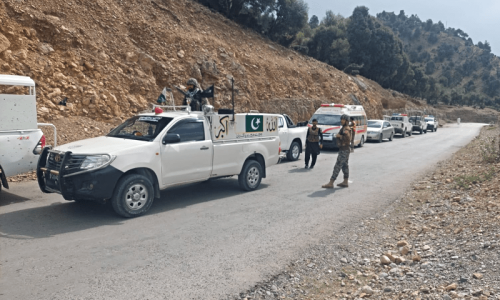PESHAWAR: The health department has issued guidelines to prevent transmission of Crimean-Congo Haemorrhagic Fever (CCHF) in animal markets ahead of Eidul Azha.
CCHF, usually transmitted by ticks to humans and through contact with infected animal via blood, has killed four persons in the province during the last one month. The virus is spreadable from human-to-human through blood contact. Bites by ticks found in the animals cause the infection.
The advisory has been issued from the office of Director-General Health Services Khyber Pakhtunkhwa to all health facilities, livestock department and stakeholders to minimise the chances of transmission of Congo fever and ensure timely diagnosis and management of the confirmed cases.
There are fears that cases may emerge as CCHF spreads from animals to humans and during the Eidul Azha people come into contact with sacrificial animals.
Hospitals advised to send specimen of suspected patients to KMU lab
The advisory has asked the people to adhere to protective measures while visiting the animal markets and other high-risk places. The transmission of CCHF from animals to humans occurs via ticks, which can be avoided by wearing protective clothing, including long sleeves and trousers. Use of light-coloured clothes is also advised to allow detection of ticks easily.
It said that people should regularly examine their clothes to remove ticks if they found. It has also suggested use of insects repellent and avoiding the places where ticks are found as cases are being reported in hospitals due to outbreak of the disease transmitted from animals to people.
Officials in health department said that suspected cases were reported by Hayatabad Medical Complex. They said three patients belonging to Lower Kurram were brought to HMC. Two of them were confirmed and the third one was suspected, who recovered. All of the three were butchers and cattle handlers.
Another patient from Kafor Dheri Peshawar breathed his last in HMC. Investigation by a team formed by Peshawar district health officer found that the father and brother of the victim had also died due to similar symptoms two week apart. Another patient from their neighbourhood was also admitted to HMC who tested positive and expired last week.
The officials of district administration and health department visited the affected community for case response and implementing preventive and control measures along with livestock department and supervised anti-ticks spray in the area, home to a large cattle market.
The advisory said that to put brakes on the disease transmission and risk due to anticipated increased interaction between humans and animals during the upcoming Eidul Azha, it was imperative to be vigilant about the situation and take necessary steps to interrupt the transmission of CCHF. It added that people and animal healthcare authorities and other relevant stakeholders should be sensitised to further strengthen and improve the level of preparedness for prevention and control of CCHF.
It said that several types of wild and domestic animals such as goats, sheep, cows and hares served as amplifying hosts for the virus, which caused viral haemorrhagic fever outbreaks. The case fatality rate of the disease is 10per cent to 40 per cent.
The hospitals have already been informed to take specimens from the suspected patients and send the same to Public Health Reference Laboratory at Khyber Medical University for PCR test, which is conducted free of cost.
“The municipalities should make appropriate arrangements for disposal and burial of the remains of the animals after slaughtering on Eidul Azha,” said the advisory.
Published in Dawn, July 4th, 2022











































